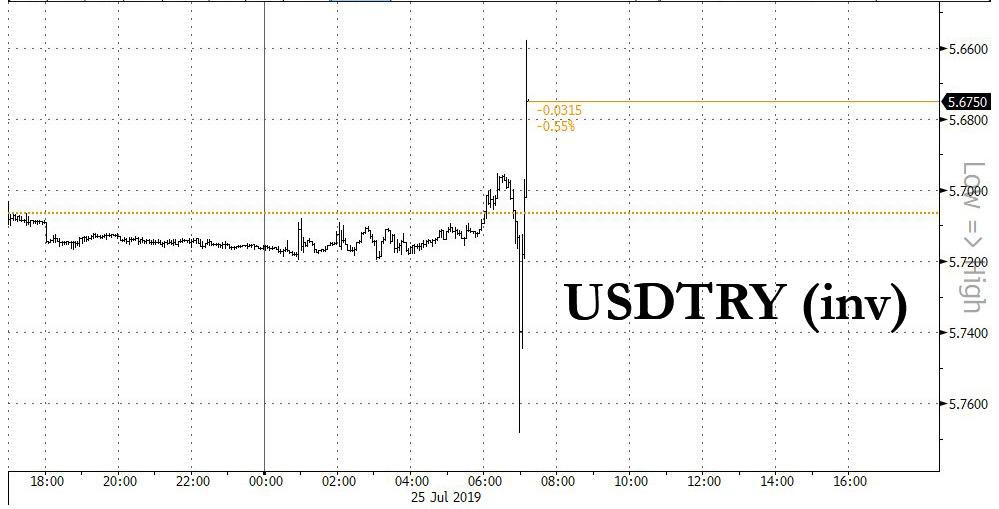When Turkish president Erdogan sacked the now former Turkish central bank head Ceitnkaya two weeks ago because the latter refused to ease monetary policy despite the country’s surging inflation and tumbling currency, it was no longer a question if the central bank would cut rates but by how much.
We got the answer this morning, when the CBRT (and it new head) announced that it slashed the benchmark 1-week repo rate by a whopping 425bps, from 24% to 19.75%, almost double the 250bps consensus expectation of a Bloomberg survey, due to “a moderate recovery in the economic activity.”
This is how the CBRT justified its decision to follow Erdogan’s demands for lower rates for this massive cut which will make the TRY a far less attractive carry currency, and likely lead to a resumption of the TRY’s devaluation:
Recently released data indicate a moderate recovery in the economic activity. Goods and services exports continue to display an upward trend despite the weakening in the global economic outlook, indicating improved competitiveness. In particular, strong tourism revenues support the economic activity through direct and indirect channels. Looking forward, net exports are expected to contribute to the economic growth and the gradual recovery is likely to continue with the help of the disinflation trend and the partial improvement in financial conditions. The composition of growth is having a positive impact on the external balance. Current account balance is expected to maintain its improving trend.
Recently, weaker global economic activity and heightened downside risks to inflation have strengthened the possibility that advanced economy central banks will take expansionary monetary policy steps. While these developments support the demand for emerging market assets and the risk appetite, rising protectionism and uncertainty regarding global economic policies are closely monitored in terms of their impact on both capital flows and international trade.
The CBRT also saw little risk in runaway inflation accelerating from here, despite prices – especially food – still soaring:
Inflation outlook continued to improve. In the second quarter, inflation displayed a significant fall with the contribution from a deceleration in unprocessed food and energy prices. Domestic demand conditions and the tight monetary policy continue to support disinflation. Underlying trend indicators, supply side factors, and import prices lead to an improvement in the inflation outlook. In light of these developments, recent forecast revisions suggest that inflation is likely to materialize slightly below the projections of the April Inflation Report by the end of the year. Accordingly, considering all the factors affecting inflation outlook, the Committee decided to reduce the policy rate by 425 basis points.
And while the initial kneejerk reaction was one expecting even more rate cuts, the CBRT did note that it would remain data-dependent and cautious on monetary policy, which prompted some to anticipate less easing in the future.
The Committee assesses that maintaining a sustained disinflation process is the key for achieving lower sovereign risk, lower long-term interest rates, and stronger economic recovery. Keeping the disinflation process in track with the targeted path requires the continuation of a cautious monetary stance. In this respect, the extent of the monetary tightness will be determined by considering the indicators of the underlying inflation trend to ensure the continuation of the disinflation process. The Central Bank will continue to use all available instruments in pursuit of the price stability and financial stability objectives.
In response, the Turkish lira initially tumbled as low as 5.7681, but then promptly retraced all losses, and has since soared as high as 5.6579, on what some suspect was central bank intervention to prevent the initial momentum from being in a downward direction.
via ZeroHedge News https://ift.tt/2Y2d6nf Tyler Durden
